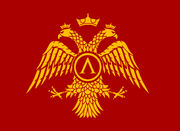| Spartan Empire | |
| [[File: Spartan Empire Flag Nation Flag | |
| Leader | Sparta Emperor |
|---|---|
| Government | -Autocratic Republic
-Bloodline Monarchy (De facto) |
| Nation Statistics | |
| Population | -100.000 |
| Power | -Imperial Army |
| Alliance | *Roman Empire (Before) |
| Updated | {{{updated}}} |
The Spartan Empire (Latin: Imperium Lacedaemonius, Greek: Σπάρτα) is considered to be one of most successful empires in the world. After 650 BC, Sparta rose to become the dominant military land-power. Today, Sparta is best know for its well-trained, fearless, and loyal soilders.
Classical Sparta[]
In the Second Messenian War, Sparta established itself as a local power in Peloponnesus and the rest of Greece. During the following centuries, Sparta's reputation as a land-fighting force was unequaled. In 480 BC a small force of Spartans, Thespians, and Thebans led by King Leonidas (approximately 300 were full Spartiates, 700 were Thespians, and 400 were Thebans although these numbers do not reflect casualties incurred prior to the final battle), made a legendary last stand at the Battle of Thermopylae against the massive Persian army, inflicting very high casualties on the Persian forces before finally being encircled. The superior weaponry, strategy, and bronze armour of the Greek hoplites and their phalanx again proved their worth one year later when Sparta assembled at full strength and led a Greek alliance against the Persians at the battle of Plataea.
Hellenistic and Roman Sparta[]
Sparta never fully recovered from the losses that the Spartans suffered at Leuctra in 371 BC and the subsequent helot revolts. Nonetheless, it was able to continue as a regional power for over two centuries. Neither Philip II nor his son Alexander the Great attempted to conquer Sparta itself.
During Alexander's campaigns in the east, the Spartan king, Agis III sent a force to Crete in 333 BC with the aim of securing the island for Sparta. Agis next took command of allied Greek forces against Macedon, gaining early successes, before laying siege to Megalopolis in 331 BC. A large Macedonian army under general Antipater marched to its relief and defeated the Spartan-led force in a pitched battle. More than 5,300 of the Spartans and their allies were killed in battle, and 3,500 of Antipater's troops. Agis, now wounded and unable to stand, ordered his men to leave him behind to face the advancing Macedonian army so that he could buy them time to retreat. On his knees, the Spartan king slew several enemy soldiers before being finally killed by a javelin.[1]Alexander was merciful, and he only forced the Spartans to join the League of Corinth, which they had previously refused to join.
Even during its decline, Sparta never forgot its claims on being the "defender of Hellenism" and its Laconic wit. An anecdote has it that when Philip II sent a message to Sparta saying "If I enter Laconia, I will raze Sparta", the Spartans responded with the single, terse reply: "If."
When Philip created the league of the Greeks on the pretext of unifying Greece against Persia, the Spartans chose not to join—they had no interest in joining a pan-Greek expedition if it was not under Spartan leadership. Thus, upon the conquest of Persia, Alexander the Great sent to Athens 300 suits of Persian armour with the following inscription Alexander, son of Philip, and all the Greeks except the Spartans, give these offerings taken from the foreigners who live in Asia [emphasis added].
During the Punic Wars Sparta was an ally of the Roman Republic. Spartan political independence was put to an end when it was eventually forced into the Achaean League. In 146 BC Greece was conquered by the Roman general Lucius Mummius. During the Roman conquest, Spartans continued their way of life, and the city became a tourist attraction for the Roman elite who came to observe exotic Spartan customs.
The Rise of Spartan Empire[]
After the collapse of Constantinople, Greece was divided into many nations.
Mark the Great, King of Sparta, was able to unite Greece under his genius military tactics,and well-train and fearless warriors. He managed to annex many nations such as Macedonia, Athens, and Cyprus...Later on, he drove the Turkish forces out of Constantinople and managed to get back what belonged to the Greek people.
After losing many battles, the Turks were so afraid of his might and power that they had to run to Egypt and Persia. At that time, Leonidas was able to annex the whole Kingdom of Rum and move his way down South.
After 6 years of prepare, he was able to take back the holy land (Jerusalem) from the Mulism with the assitance of France, England, Papal States and Italy...With this achievement, he called himself Emperor of Spartan Empire and expanded the Empire further East.
